Financial Analysis of Rio Tinto Group: Performance and Recommendations
VerifiedAdded on 2022/11/11
|11
|2822
|319
Report
AI Summary
This report presents a comprehensive financial analysis of the Rio Tinto Group, a leading mining company. It examines the company's operational performance, comparative advantages, and financial health using various ratios, including profitability, operational efficiency, liquidity, and solvency. The analysis covers key financial metrics such as profit margins, return on assets, and debt-to-equity ratios, providing insights into the company's performance over the years. The report also investigates share price movements, factors affecting the share price, and the company's capital structure. Furthermore, it includes a recommendation letter based on the analysis, concluding with an assessment of Rio Tinto's overall financial standing and investment potential. The report uses data from financial statements and market analysis to provide a detailed overview of the company's performance and future prospects.
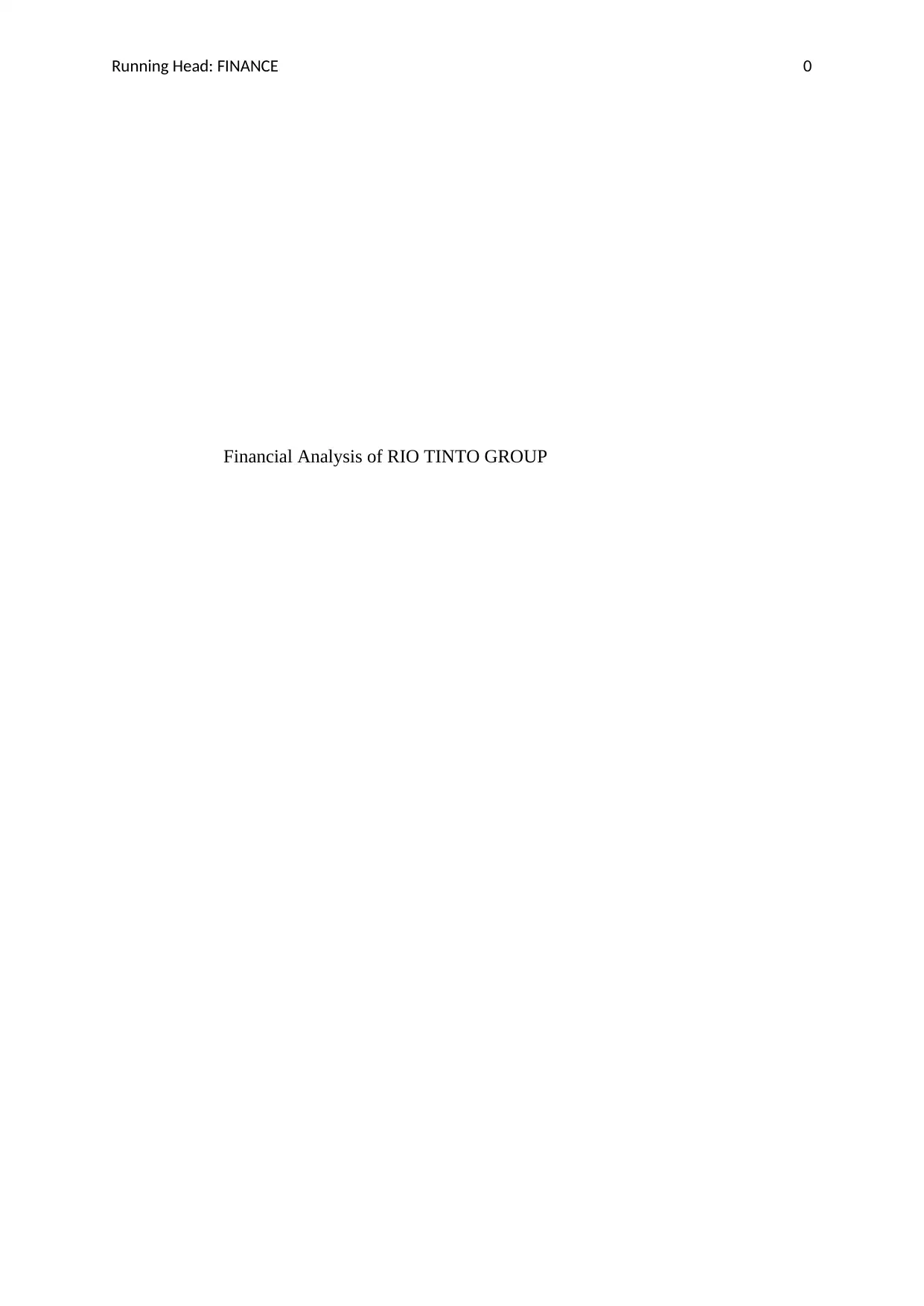
Running Head: FINANCE 0
Financial Analysis of RIO TINTO GROUP
Financial Analysis of RIO TINTO GROUP
Paraphrase This Document
Need a fresh take? Get an instant paraphrase of this document with our AI Paraphraser
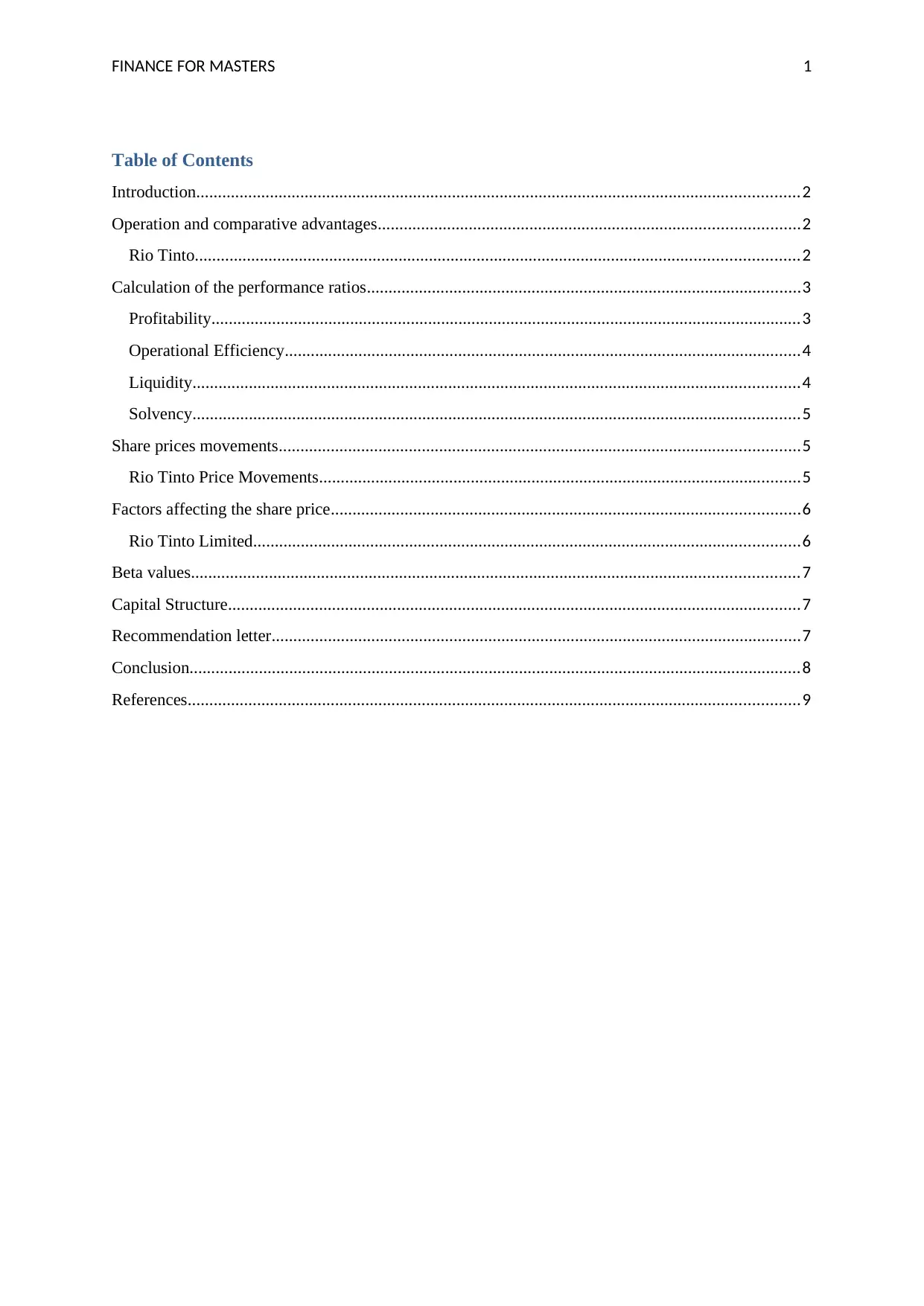
FINANCE FOR MASTERS 1
Table of Contents
Introduction...........................................................................................................................................2
Operation and comparative advantages.................................................................................................2
Rio Tinto...........................................................................................................................................2
Calculation of the performance ratios....................................................................................................3
Profitability........................................................................................................................................3
Operational Efficiency.......................................................................................................................4
Liquidity............................................................................................................................................4
Solvency............................................................................................................................................5
Share prices movements........................................................................................................................5
Rio Tinto Price Movements...............................................................................................................5
Factors affecting the share price............................................................................................................6
Rio Tinto Limited..............................................................................................................................6
Beta values............................................................................................................................................7
Capital Structure....................................................................................................................................7
Recommendation letter..........................................................................................................................7
Conclusion.............................................................................................................................................8
References.............................................................................................................................................9
Table of Contents
Introduction...........................................................................................................................................2
Operation and comparative advantages.................................................................................................2
Rio Tinto...........................................................................................................................................2
Calculation of the performance ratios....................................................................................................3
Profitability........................................................................................................................................3
Operational Efficiency.......................................................................................................................4
Liquidity............................................................................................................................................4
Solvency............................................................................................................................................5
Share prices movements........................................................................................................................5
Rio Tinto Price Movements...............................................................................................................5
Factors affecting the share price............................................................................................................6
Rio Tinto Limited..............................................................................................................................6
Beta values............................................................................................................................................7
Capital Structure....................................................................................................................................7
Recommendation letter..........................................................................................................................7
Conclusion.............................................................................................................................................8
References.............................................................................................................................................9
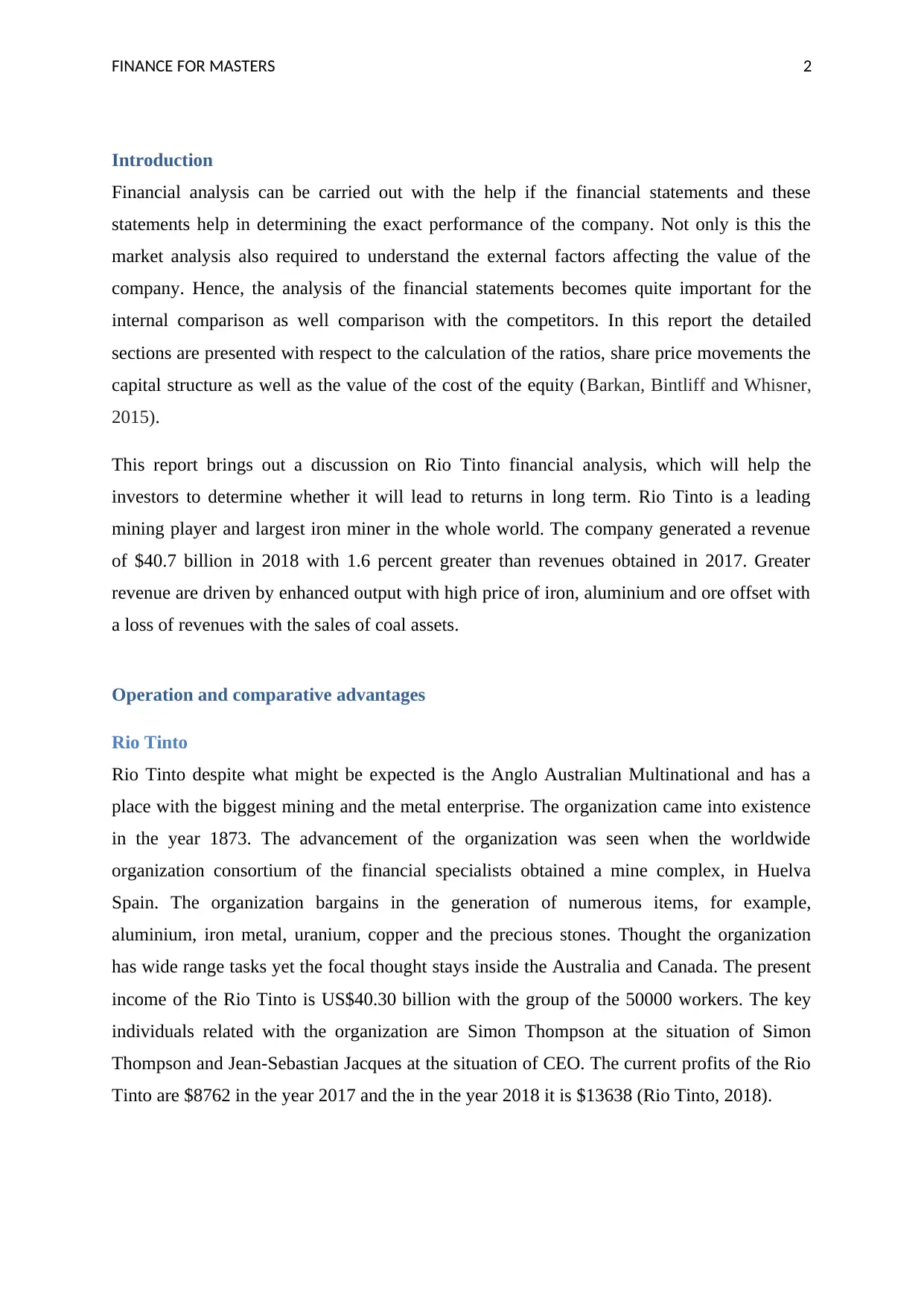
FINANCE FOR MASTERS 2
Introduction
Financial analysis can be carried out with the help if the financial statements and these
statements help in determining the exact performance of the company. Not only is this the
market analysis also required to understand the external factors affecting the value of the
company. Hence, the analysis of the financial statements becomes quite important for the
internal comparison as well comparison with the competitors. In this report the detailed
sections are presented with respect to the calculation of the ratios, share price movements the
capital structure as well as the value of the cost of the equity (Barkan, Bintliff and Whisner,
2015).
This report brings out a discussion on Rio Tinto financial analysis, which will help the
investors to determine whether it will lead to returns in long term. Rio Tinto is a leading
mining player and largest iron miner in the whole world. The company generated a revenue
of $40.7 billion in 2018 with 1.6 percent greater than revenues obtained in 2017. Greater
revenue are driven by enhanced output with high price of iron, aluminium and ore offset with
a loss of revenues with the sales of coal assets.
Operation and comparative advantages
Rio Tinto
Rio Tinto despite what might be expected is the Anglo Australian Multinational and has a
place with the biggest mining and the metal enterprise. The organization came into existence
in the year 1873. The advancement of the organization was seen when the worldwide
organization consortium of the financial specialists obtained a mine complex, in Huelva
Spain. The organization bargains in the generation of numerous items, for example,
aluminium, iron metal, uranium, copper and the precious stones. Thought the organization
has wide range tasks yet the focal thought stays inside the Australia and Canada. The present
income of the Rio Tinto is US$40.30 billion with the group of the 50000 workers. The key
individuals related with the organization are Simon Thompson at the situation of Simon
Thompson and Jean-Sebastian Jacques at the situation of CEO. The current profits of the Rio
Tinto are $8762 in the year 2017 and the in the year 2018 it is $13638 (Rio Tinto, 2018).
Introduction
Financial analysis can be carried out with the help if the financial statements and these
statements help in determining the exact performance of the company. Not only is this the
market analysis also required to understand the external factors affecting the value of the
company. Hence, the analysis of the financial statements becomes quite important for the
internal comparison as well comparison with the competitors. In this report the detailed
sections are presented with respect to the calculation of the ratios, share price movements the
capital structure as well as the value of the cost of the equity (Barkan, Bintliff and Whisner,
2015).
This report brings out a discussion on Rio Tinto financial analysis, which will help the
investors to determine whether it will lead to returns in long term. Rio Tinto is a leading
mining player and largest iron miner in the whole world. The company generated a revenue
of $40.7 billion in 2018 with 1.6 percent greater than revenues obtained in 2017. Greater
revenue are driven by enhanced output with high price of iron, aluminium and ore offset with
a loss of revenues with the sales of coal assets.
Operation and comparative advantages
Rio Tinto
Rio Tinto despite what might be expected is the Anglo Australian Multinational and has a
place with the biggest mining and the metal enterprise. The organization came into existence
in the year 1873. The advancement of the organization was seen when the worldwide
organization consortium of the financial specialists obtained a mine complex, in Huelva
Spain. The organization bargains in the generation of numerous items, for example,
aluminium, iron metal, uranium, copper and the precious stones. Thought the organization
has wide range tasks yet the focal thought stays inside the Australia and Canada. The present
income of the Rio Tinto is US$40.30 billion with the group of the 50000 workers. The key
individuals related with the organization are Simon Thompson at the situation of Simon
Thompson and Jean-Sebastian Jacques at the situation of CEO. The current profits of the Rio
Tinto are $8762 in the year 2017 and the in the year 2018 it is $13638 (Rio Tinto, 2018).
⊘ This is a preview!⊘
Do you want full access?
Subscribe today to unlock all pages.

Trusted by 1+ million students worldwide
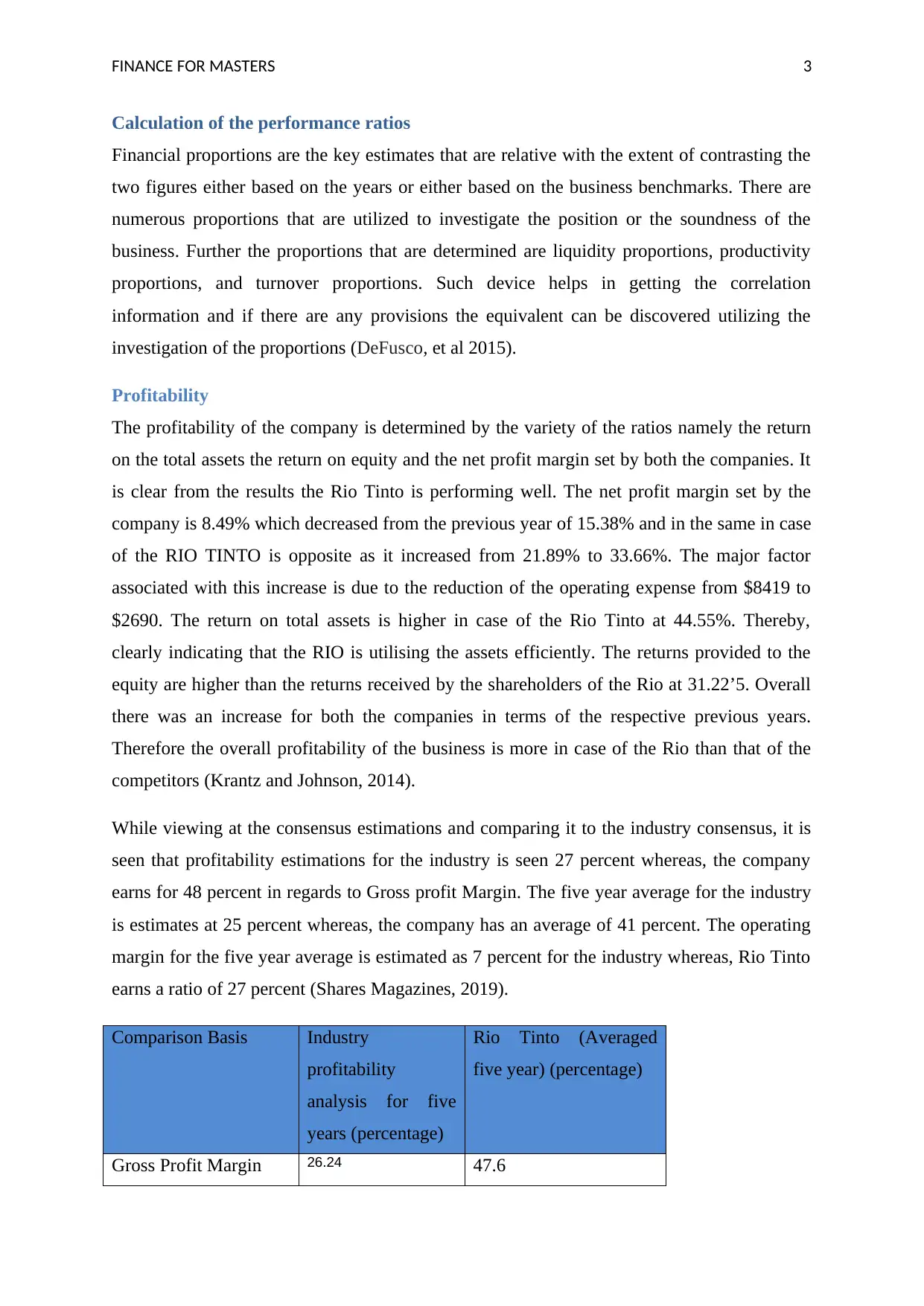
FINANCE FOR MASTERS 3
Calculation of the performance ratios
Financial proportions are the key estimates that are relative with the extent of contrasting the
two figures either based on the years or either based on the business benchmarks. There are
numerous proportions that are utilized to investigate the position or the soundness of the
business. Further the proportions that are determined are liquidity proportions, productivity
proportions, and turnover proportions. Such device helps in getting the correlation
information and if there are any provisions the equivalent can be discovered utilizing the
investigation of the proportions (DeFusco, et al 2015).
Profitability
The profitability of the company is determined by the variety of the ratios namely the return
on the total assets the return on equity and the net profit margin set by both the companies. It
is clear from the results the Rio Tinto is performing well. The net profit margin set by the
company is 8.49% which decreased from the previous year of 15.38% and in the same in case
of the RIO TINTO is opposite as it increased from 21.89% to 33.66%. The major factor
associated with this increase is due to the reduction of the operating expense from $8419 to
$2690. The return on total assets is higher in case of the Rio Tinto at 44.55%. Thereby,
clearly indicating that the RIO is utilising the assets efficiently. The returns provided to the
equity are higher than the returns received by the shareholders of the Rio at 31.22’5. Overall
there was an increase for both the companies in terms of the respective previous years.
Therefore the overall profitability of the business is more in case of the Rio than that of the
competitors (Krantz and Johnson, 2014).
While viewing at the consensus estimations and comparing it to the industry consensus, it is
seen that profitability estimations for the industry is seen 27 percent whereas, the company
earns for 48 percent in regards to Gross profit Margin. The five year average for the industry
is estimates at 25 percent whereas, the company has an average of 41 percent. The operating
margin for the five year average is estimated as 7 percent for the industry whereas, Rio Tinto
earns a ratio of 27 percent (Shares Magazines, 2019).
Comparison Basis Industry
profitability
analysis for five
years (percentage)
Rio Tinto (Averaged
five year) (percentage)
Gross Profit Margin 26.24 47.6
Calculation of the performance ratios
Financial proportions are the key estimates that are relative with the extent of contrasting the
two figures either based on the years or either based on the business benchmarks. There are
numerous proportions that are utilized to investigate the position or the soundness of the
business. Further the proportions that are determined are liquidity proportions, productivity
proportions, and turnover proportions. Such device helps in getting the correlation
information and if there are any provisions the equivalent can be discovered utilizing the
investigation of the proportions (DeFusco, et al 2015).
Profitability
The profitability of the company is determined by the variety of the ratios namely the return
on the total assets the return on equity and the net profit margin set by both the companies. It
is clear from the results the Rio Tinto is performing well. The net profit margin set by the
company is 8.49% which decreased from the previous year of 15.38% and in the same in case
of the RIO TINTO is opposite as it increased from 21.89% to 33.66%. The major factor
associated with this increase is due to the reduction of the operating expense from $8419 to
$2690. The return on total assets is higher in case of the Rio Tinto at 44.55%. Thereby,
clearly indicating that the RIO is utilising the assets efficiently. The returns provided to the
equity are higher than the returns received by the shareholders of the Rio at 31.22’5. Overall
there was an increase for both the companies in terms of the respective previous years.
Therefore the overall profitability of the business is more in case of the Rio than that of the
competitors (Krantz and Johnson, 2014).
While viewing at the consensus estimations and comparing it to the industry consensus, it is
seen that profitability estimations for the industry is seen 27 percent whereas, the company
earns for 48 percent in regards to Gross profit Margin. The five year average for the industry
is estimates at 25 percent whereas, the company has an average of 41 percent. The operating
margin for the five year average is estimated as 7 percent for the industry whereas, Rio Tinto
earns a ratio of 27 percent (Shares Magazines, 2019).
Comparison Basis Industry
profitability
analysis for five
years (percentage)
Rio Tinto (Averaged
five year) (percentage)
Gross Profit Margin 26.24 47.6
Paraphrase This Document
Need a fresh take? Get an instant paraphrase of this document with our AI Paraphraser
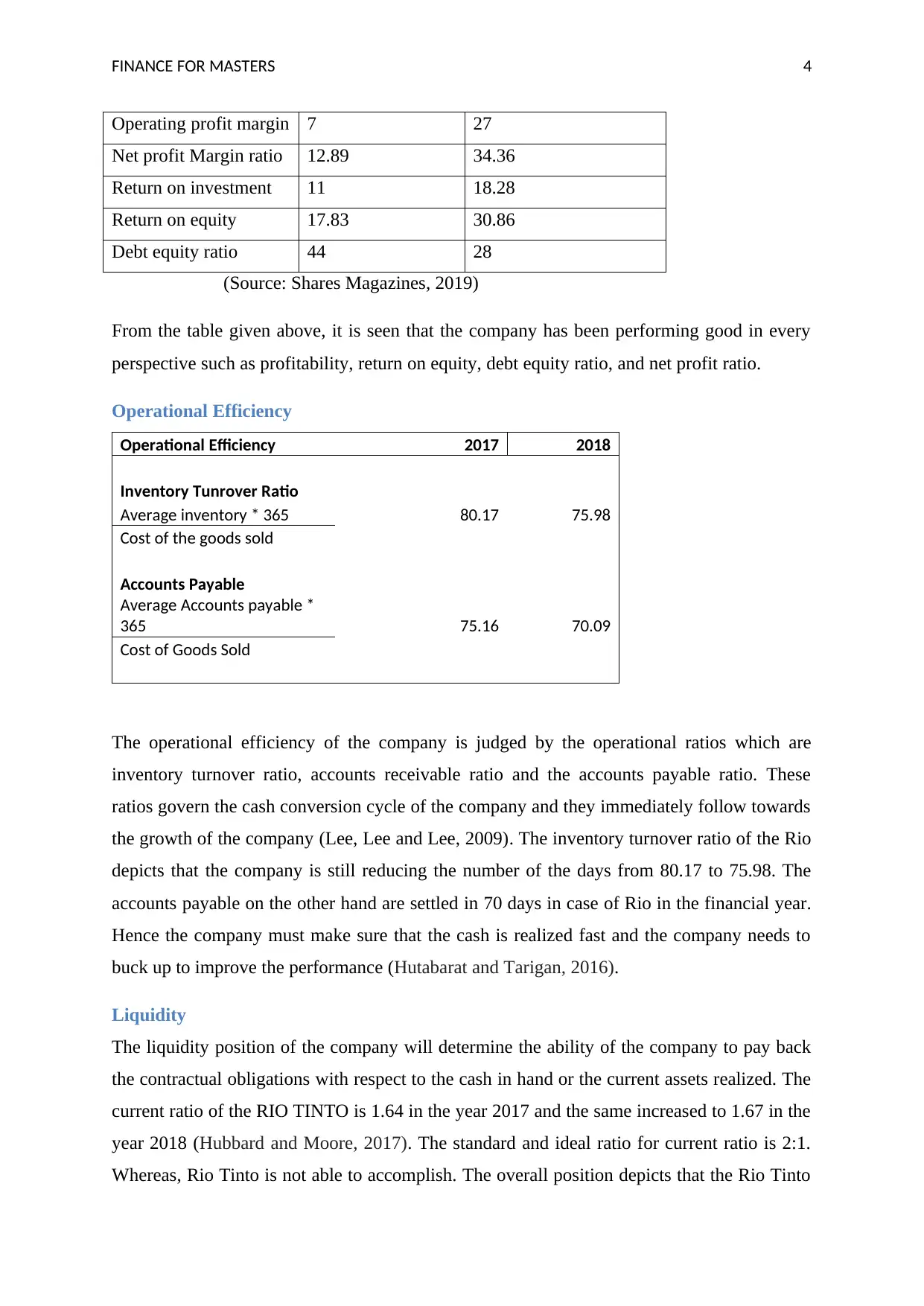
FINANCE FOR MASTERS 4
Operating profit margin 7 27
Net profit Margin ratio 12.89 34.36
Return on investment 11 18.28
Return on equity 17.83 30.86
Debt equity ratio 44 28
(Source: Shares Magazines, 2019)
From the table given above, it is seen that the company has been performing good in every
perspective such as profitability, return on equity, debt equity ratio, and net profit ratio.
Operational Efficiency
Operational Efficiency 2017 2018
Inventory Tunrover Ratio
Average inventory * 365 80.17 75.98
Cost of the goods sold
Accounts Payable
Average Accounts payable *
365 75.16 70.09
Cost of Goods Sold
The operational efficiency of the company is judged by the operational ratios which are
inventory turnover ratio, accounts receivable ratio and the accounts payable ratio. These
ratios govern the cash conversion cycle of the company and they immediately follow towards
the growth of the company (Lee, Lee and Lee, 2009). The inventory turnover ratio of the Rio
depicts that the company is still reducing the number of the days from 80.17 to 75.98. The
accounts payable on the other hand are settled in 70 days in case of Rio in the financial year.
Hence the company must make sure that the cash is realized fast and the company needs to
buck up to improve the performance (Hutabarat and Tarigan, 2016).
Liquidity
The liquidity position of the company will determine the ability of the company to pay back
the contractual obligations with respect to the cash in hand or the current assets realized. The
current ratio of the RIO TINTO is 1.64 in the year 2017 and the same increased to 1.67 in the
year 2018 (Hubbard and Moore, 2017). The standard and ideal ratio for current ratio is 2:1.
Whereas, Rio Tinto is not able to accomplish. The overall position depicts that the Rio Tinto
Operating profit margin 7 27
Net profit Margin ratio 12.89 34.36
Return on investment 11 18.28
Return on equity 17.83 30.86
Debt equity ratio 44 28
(Source: Shares Magazines, 2019)
From the table given above, it is seen that the company has been performing good in every
perspective such as profitability, return on equity, debt equity ratio, and net profit ratio.
Operational Efficiency
Operational Efficiency 2017 2018
Inventory Tunrover Ratio
Average inventory * 365 80.17 75.98
Cost of the goods sold
Accounts Payable
Average Accounts payable *
365 75.16 70.09
Cost of Goods Sold
The operational efficiency of the company is judged by the operational ratios which are
inventory turnover ratio, accounts receivable ratio and the accounts payable ratio. These
ratios govern the cash conversion cycle of the company and they immediately follow towards
the growth of the company (Lee, Lee and Lee, 2009). The inventory turnover ratio of the Rio
depicts that the company is still reducing the number of the days from 80.17 to 75.98. The
accounts payable on the other hand are settled in 70 days in case of Rio in the financial year.
Hence the company must make sure that the cash is realized fast and the company needs to
buck up to improve the performance (Hutabarat and Tarigan, 2016).
Liquidity
The liquidity position of the company will determine the ability of the company to pay back
the contractual obligations with respect to the cash in hand or the current assets realized. The
current ratio of the RIO TINTO is 1.64 in the year 2017 and the same increased to 1.67 in the
year 2018 (Hubbard and Moore, 2017). The standard and ideal ratio for current ratio is 2:1.
Whereas, Rio Tinto is not able to accomplish. The overall position depicts that the Rio Tinto
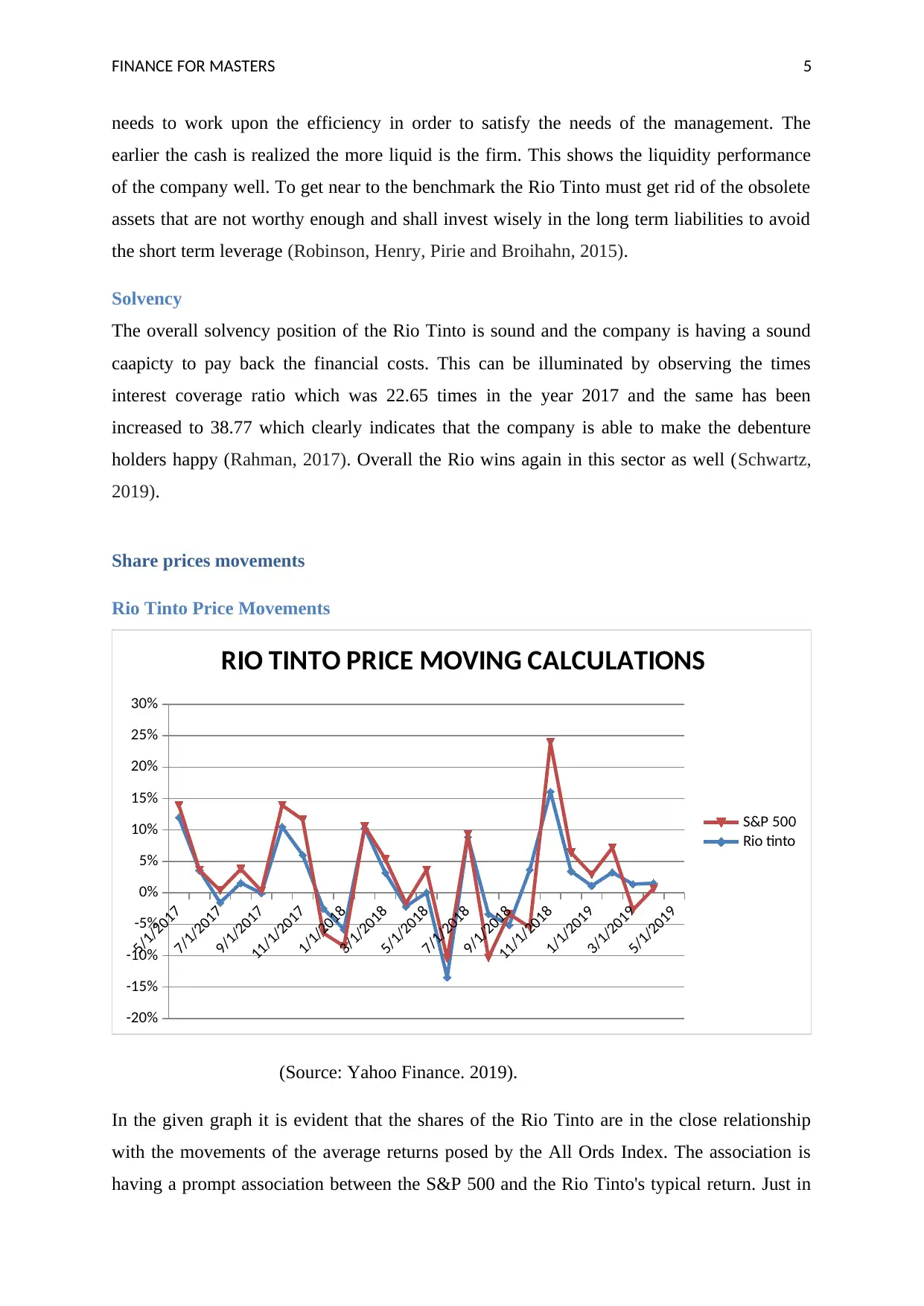
FINANCE FOR MASTERS 5
needs to work upon the efficiency in order to satisfy the needs of the management. The
earlier the cash is realized the more liquid is the firm. This shows the liquidity performance
of the company well. To get near to the benchmark the Rio Tinto must get rid of the obsolete
assets that are not worthy enough and shall invest wisely in the long term liabilities to avoid
the short term leverage (Robinson, Henry, Pirie and Broihahn, 2015).
Solvency
The overall solvency position of the Rio Tinto is sound and the company is having a sound
caapicty to pay back the financial costs. This can be illuminated by observing the times
interest coverage ratio which was 22.65 times in the year 2017 and the same has been
increased to 38.77 which clearly indicates that the company is able to make the debenture
holders happy (Rahman, 2017). Overall the Rio wins again in this sector as well (Schwartz,
2019).
Share prices movements
Rio Tinto Price Movements
5/1/2017
7/1/2017
9/1/2017
11/1/2017
1/1/2018
3/1/2018
5/1/2018
7/1/2018
9/1/2018
11/1/2018
1/1/2019
3/1/2019
5/1/2019
-20%
-15%
-10%
-5%
0%
5%
10%
15%
20%
25%
30%
RIO TINTO PRICE MOVING CALCULATIONS
S&P 500
Rio tinto
(Source: Yahoo Finance. 2019).
In the given graph it is evident that the shares of the Rio Tinto are in the close relationship
with the movements of the average returns posed by the All Ords Index. The association is
having a prompt association between the S&P 500 and the Rio Tinto's typical return. Just in
needs to work upon the efficiency in order to satisfy the needs of the management. The
earlier the cash is realized the more liquid is the firm. This shows the liquidity performance
of the company well. To get near to the benchmark the Rio Tinto must get rid of the obsolete
assets that are not worthy enough and shall invest wisely in the long term liabilities to avoid
the short term leverage (Robinson, Henry, Pirie and Broihahn, 2015).
Solvency
The overall solvency position of the Rio Tinto is sound and the company is having a sound
caapicty to pay back the financial costs. This can be illuminated by observing the times
interest coverage ratio which was 22.65 times in the year 2017 and the same has been
increased to 38.77 which clearly indicates that the company is able to make the debenture
holders happy (Rahman, 2017). Overall the Rio wins again in this sector as well (Schwartz,
2019).
Share prices movements
Rio Tinto Price Movements
5/1/2017
7/1/2017
9/1/2017
11/1/2017
1/1/2018
3/1/2018
5/1/2018
7/1/2018
9/1/2018
11/1/2018
1/1/2019
3/1/2019
5/1/2019
-20%
-15%
-10%
-5%
0%
5%
10%
15%
20%
25%
30%
RIO TINTO PRICE MOVING CALCULATIONS
S&P 500
Rio tinto
(Source: Yahoo Finance. 2019).
In the given graph it is evident that the shares of the Rio Tinto are in the close relationship
with the movements of the average returns posed by the All Ords Index. The association is
having a prompt association between the S&P 500 and the Rio Tinto's typical return. Just in
⊘ This is a preview!⊘
Do you want full access?
Subscribe today to unlock all pages.

Trusted by 1+ million students worldwide
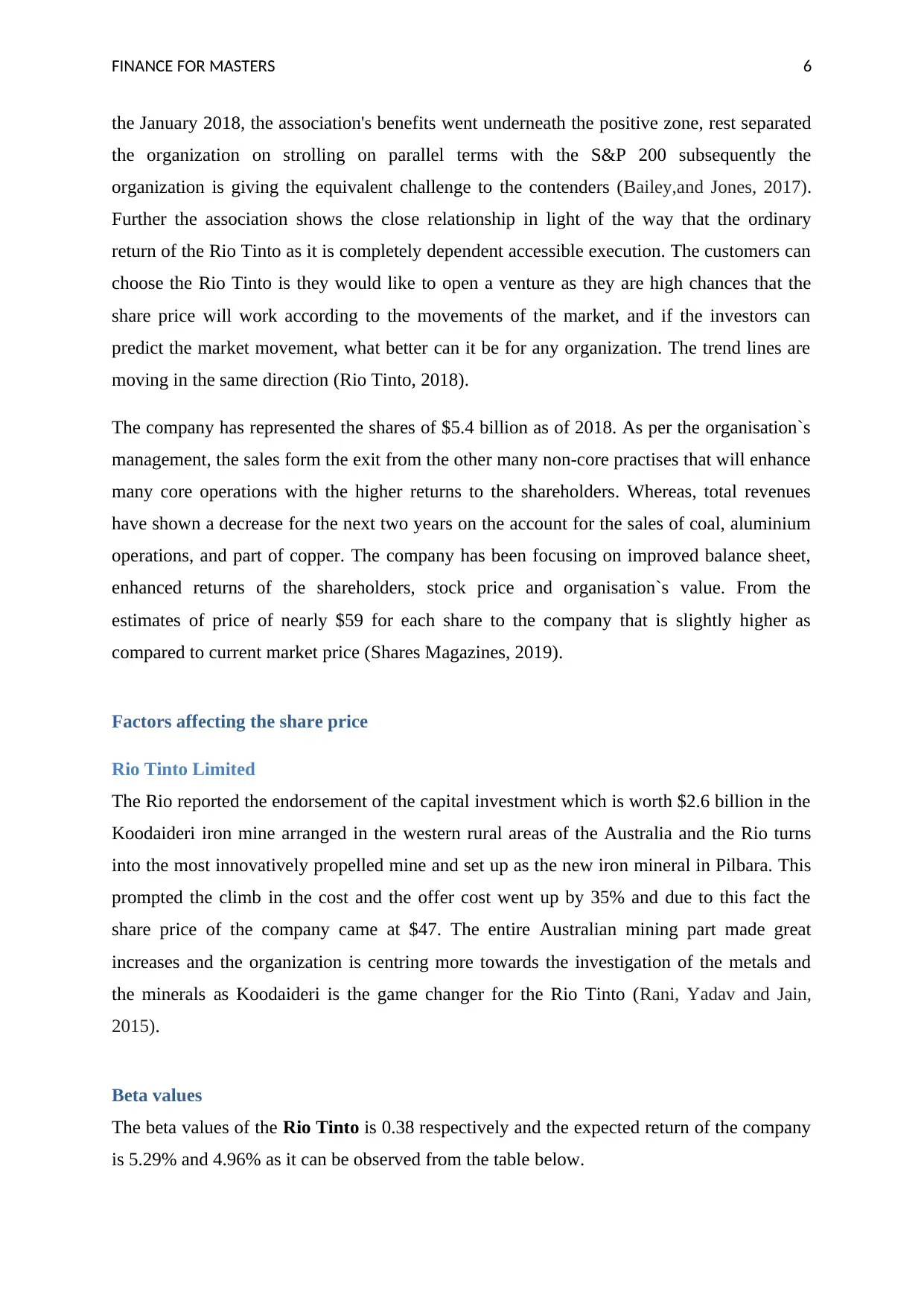
FINANCE FOR MASTERS 6
the January 2018, the association's benefits went underneath the positive zone, rest separated
the organization on strolling on parallel terms with the S&P 200 subsequently the
organization is giving the equivalent challenge to the contenders (Bailey,and Jones, 2017).
Further the association shows the close relationship in light of the way that the ordinary
return of the Rio Tinto as it is completely dependent accessible execution. The customers can
choose the Rio Tinto is they would like to open a venture as they are high chances that the
share price will work according to the movements of the market, and if the investors can
predict the market movement, what better can it be for any organization. The trend lines are
moving in the same direction (Rio Tinto, 2018).
The company has represented the shares of $5.4 billion as of 2018. As per the organisation`s
management, the sales form the exit from the other many non-core practises that will enhance
many core operations with the higher returns to the shareholders. Whereas, total revenues
have shown a decrease for the next two years on the account for the sales of coal, aluminium
operations, and part of copper. The company has been focusing on improved balance sheet,
enhanced returns of the shareholders, stock price and organisation`s value. From the
estimates of price of nearly $59 for each share to the company that is slightly higher as
compared to current market price (Shares Magazines, 2019).
Factors affecting the share price
Rio Tinto Limited
The Rio reported the endorsement of the capital investment which is worth $2.6 billion in the
Koodaideri iron mine arranged in the western rural areas of the Australia and the Rio turns
into the most innovatively propelled mine and set up as the new iron mineral in Pilbara. This
prompted the climb in the cost and the offer cost went up by 35% and due to this fact the
share price of the company came at $47. The entire Australian mining part made great
increases and the organization is centring more towards the investigation of the metals and
the minerals as Koodaideri is the game changer for the Rio Tinto (Rani, Yadav and Jain,
2015).
Beta values
The beta values of the Rio Tinto is 0.38 respectively and the expected return of the company
is 5.29% and 4.96% as it can be observed from the table below.
the January 2018, the association's benefits went underneath the positive zone, rest separated
the organization on strolling on parallel terms with the S&P 200 subsequently the
organization is giving the equivalent challenge to the contenders (Bailey,and Jones, 2017).
Further the association shows the close relationship in light of the way that the ordinary
return of the Rio Tinto as it is completely dependent accessible execution. The customers can
choose the Rio Tinto is they would like to open a venture as they are high chances that the
share price will work according to the movements of the market, and if the investors can
predict the market movement, what better can it be for any organization. The trend lines are
moving in the same direction (Rio Tinto, 2018).
The company has represented the shares of $5.4 billion as of 2018. As per the organisation`s
management, the sales form the exit from the other many non-core practises that will enhance
many core operations with the higher returns to the shareholders. Whereas, total revenues
have shown a decrease for the next two years on the account for the sales of coal, aluminium
operations, and part of copper. The company has been focusing on improved balance sheet,
enhanced returns of the shareholders, stock price and organisation`s value. From the
estimates of price of nearly $59 for each share to the company that is slightly higher as
compared to current market price (Shares Magazines, 2019).
Factors affecting the share price
Rio Tinto Limited
The Rio reported the endorsement of the capital investment which is worth $2.6 billion in the
Koodaideri iron mine arranged in the western rural areas of the Australia and the Rio turns
into the most innovatively propelled mine and set up as the new iron mineral in Pilbara. This
prompted the climb in the cost and the offer cost went up by 35% and due to this fact the
share price of the company came at $47. The entire Australian mining part made great
increases and the organization is centring more towards the investigation of the metals and
the minerals as Koodaideri is the game changer for the Rio Tinto (Rani, Yadav and Jain,
2015).
Beta values
The beta values of the Rio Tinto is 0.38 respectively and the expected return of the company
is 5.29% and 4.96% as it can be observed from the table below.
Paraphrase This Document
Need a fresh take? Get an instant paraphrase of this document with our AI Paraphraser
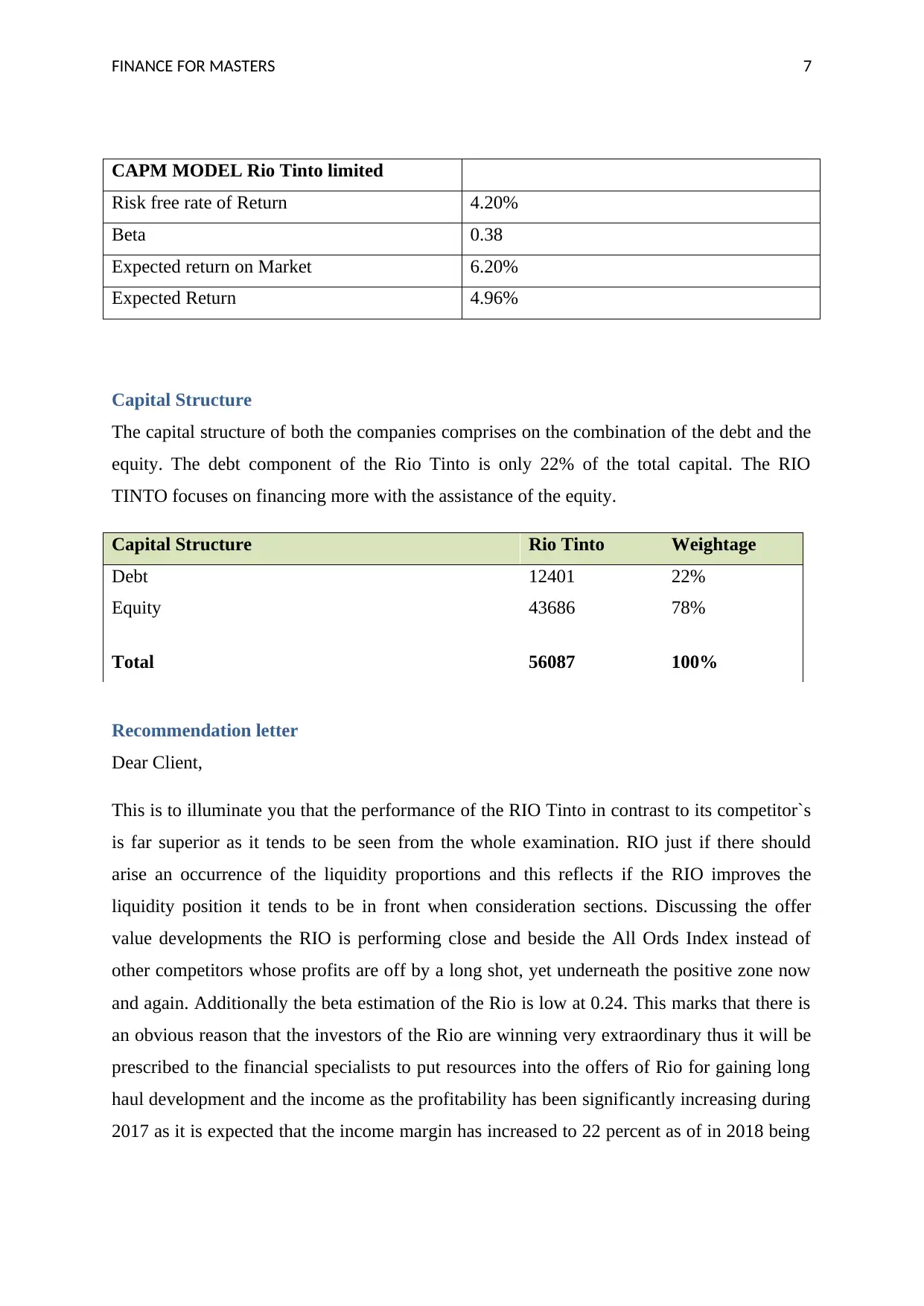
FINANCE FOR MASTERS 7
CAPM MODEL Rio Tinto limited
Risk free rate of Return 4.20%
Beta 0.38
Expected return on Market 6.20%
Expected Return 4.96%
Capital Structure
The capital structure of both the companies comprises on the combination of the debt and the
equity. The debt component of the Rio Tinto is only 22% of the total capital. The RIO
TINTO focuses on financing more with the assistance of the equity.
Capital Structure Rio Tinto Weightage
Debt 12401 22%
Equity 43686 78%
Total 56087 100%
Recommendation letter
Dear Client,
This is to illuminate you that the performance of the RIO Tinto in contrast to its competitor`s
is far superior as it tends to be seen from the whole examination. RIO just if there should
arise an occurrence of the liquidity proportions and this reflects if the RIO improves the
liquidity position it tends to be in front when consideration sections. Discussing the offer
value developments the RIO is performing close and beside the All Ords Index instead of
other competitors whose profits are off by a long shot, yet underneath the positive zone now
and again. Additionally the beta estimation of the Rio is low at 0.24. This marks that there is
an obvious reason that the investors of the Rio are winning very extraordinary thus it will be
prescribed to the financial specialists to put resources into the offers of Rio for gaining long
haul development and the income as the profitability has been significantly increasing during
2017 as it is expected that the income margin has increased to 22 percent as of in 2018 being
CAPM MODEL Rio Tinto limited
Risk free rate of Return 4.20%
Beta 0.38
Expected return on Market 6.20%
Expected Return 4.96%
Capital Structure
The capital structure of both the companies comprises on the combination of the debt and the
equity. The debt component of the Rio Tinto is only 22% of the total capital. The RIO
TINTO focuses on financing more with the assistance of the equity.
Capital Structure Rio Tinto Weightage
Debt 12401 22%
Equity 43686 78%
Total 56087 100%
Recommendation letter
Dear Client,
This is to illuminate you that the performance of the RIO Tinto in contrast to its competitor`s
is far superior as it tends to be seen from the whole examination. RIO just if there should
arise an occurrence of the liquidity proportions and this reflects if the RIO improves the
liquidity position it tends to be in front when consideration sections. Discussing the offer
value developments the RIO is performing close and beside the All Ords Index instead of
other competitors whose profits are off by a long shot, yet underneath the positive zone now
and again. Additionally the beta estimation of the Rio is low at 0.24. This marks that there is
an obvious reason that the investors of the Rio are winning very extraordinary thus it will be
prescribed to the financial specialists to put resources into the offers of Rio for gaining long
haul development and the income as the profitability has been significantly increasing during
2017 as it is expected that the income margin has increased to 22 percent as of in 2018 being
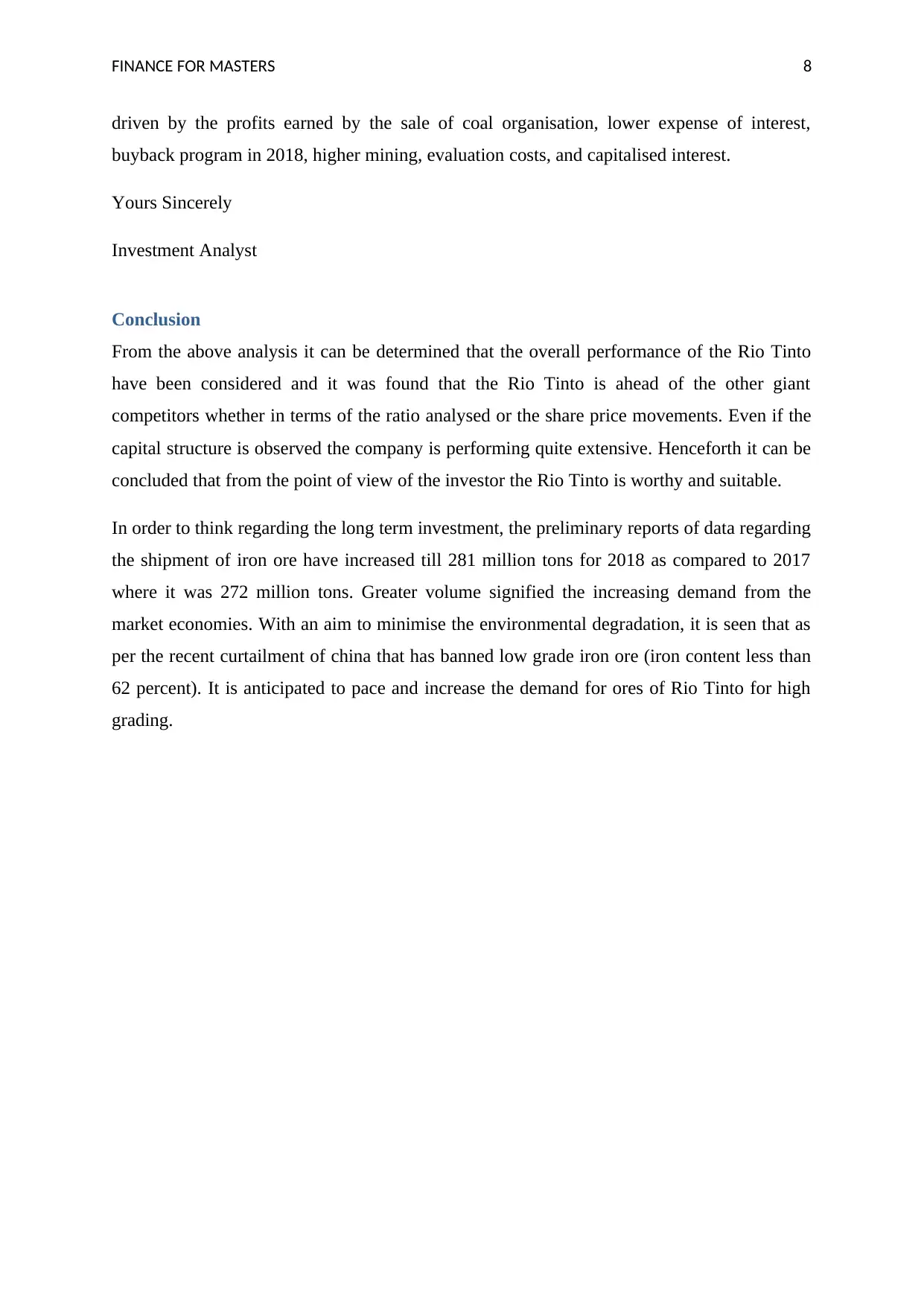
FINANCE FOR MASTERS 8
driven by the profits earned by the sale of coal organisation, lower expense of interest,
buyback program in 2018, higher mining, evaluation costs, and capitalised interest.
Yours Sincerely
Investment Analyst
Conclusion
From the above analysis it can be determined that the overall performance of the Rio Tinto
have been considered and it was found that the Rio Tinto is ahead of the other giant
competitors whether in terms of the ratio analysed or the share price movements. Even if the
capital structure is observed the company is performing quite extensive. Henceforth it can be
concluded that from the point of view of the investor the Rio Tinto is worthy and suitable.
In order to think regarding the long term investment, the preliminary reports of data regarding
the shipment of iron ore have increased till 281 million tons for 2018 as compared to 2017
where it was 272 million tons. Greater volume signified the increasing demand from the
market economies. With an aim to minimise the environmental degradation, it is seen that as
per the recent curtailment of china that has banned low grade iron ore (iron content less than
62 percent). It is anticipated to pace and increase the demand for ores of Rio Tinto for high
grading.
driven by the profits earned by the sale of coal organisation, lower expense of interest,
buyback program in 2018, higher mining, evaluation costs, and capitalised interest.
Yours Sincerely
Investment Analyst
Conclusion
From the above analysis it can be determined that the overall performance of the Rio Tinto
have been considered and it was found that the Rio Tinto is ahead of the other giant
competitors whether in terms of the ratio analysed or the share price movements. Even if the
capital structure is observed the company is performing quite extensive. Henceforth it can be
concluded that from the point of view of the investor the Rio Tinto is worthy and suitable.
In order to think regarding the long term investment, the preliminary reports of data regarding
the shipment of iron ore have increased till 281 million tons for 2018 as compared to 2017
where it was 272 million tons. Greater volume signified the increasing demand from the
market economies. With an aim to minimise the environmental degradation, it is seen that as
per the recent curtailment of china that has banned low grade iron ore (iron content less than
62 percent). It is anticipated to pace and increase the demand for ores of Rio Tinto for high
grading.
⊘ This is a preview!⊘
Do you want full access?
Subscribe today to unlock all pages.

Trusted by 1+ million students worldwide
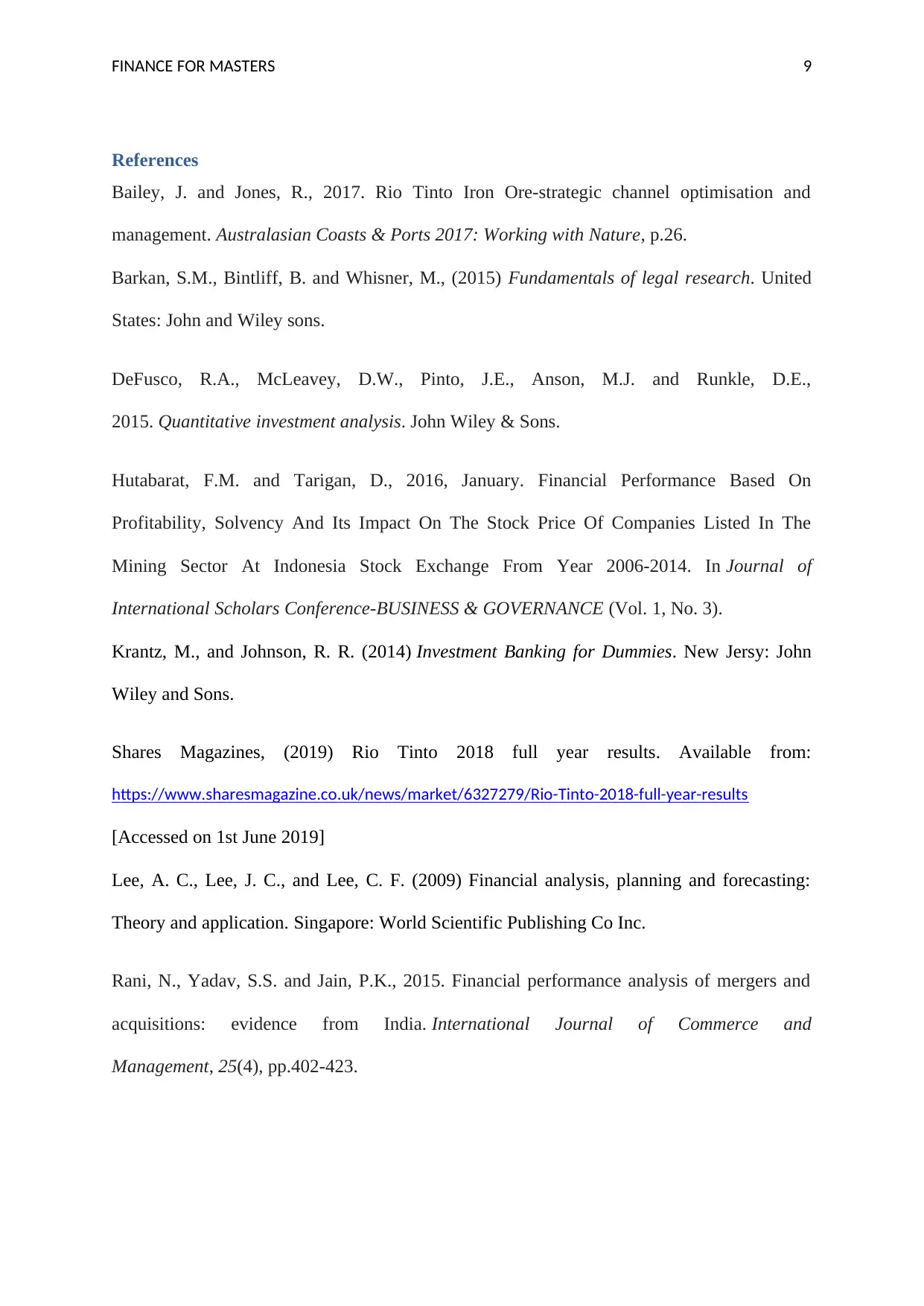
FINANCE FOR MASTERS 9
References
Bailey, J. and Jones, R., 2017. Rio Tinto Iron Ore-strategic channel optimisation and
management. Australasian Coasts & Ports 2017: Working with Nature, p.26.
Barkan, S.M., Bintliff, B. and Whisner, M., (2015) Fundamentals of legal research. United
States: John and Wiley sons.
DeFusco, R.A., McLeavey, D.W., Pinto, J.E., Anson, M.J. and Runkle, D.E.,
2015. Quantitative investment analysis. John Wiley & Sons.
Hutabarat, F.M. and Tarigan, D., 2016, January. Financial Performance Based On
Profitability, Solvency And Its Impact On The Stock Price Of Companies Listed In The
Mining Sector At Indonesia Stock Exchange From Year 2006-2014. In Journal of
International Scholars Conference-BUSINESS & GOVERNANCE (Vol. 1, No. 3).
Krantz, M., and Johnson, R. R. (2014) Investment Banking for Dummies. New Jersy: John
Wiley and Sons.
Shares Magazines, (2019) Rio Tinto 2018 full year results. Available from:
https://www.sharesmagazine.co.uk/news/market/6327279/Rio-Tinto-2018-full-year-results
[Accessed on 1st June 2019]
Lee, A. C., Lee, J. C., and Lee, C. F. (2009) Financial analysis, planning and forecasting:
Theory and application. Singapore: World Scientific Publishing Co Inc.
Rani, N., Yadav, S.S. and Jain, P.K., 2015. Financial performance analysis of mergers and
acquisitions: evidence from India. International Journal of Commerce and
Management, 25(4), pp.402-423.
References
Bailey, J. and Jones, R., 2017. Rio Tinto Iron Ore-strategic channel optimisation and
management. Australasian Coasts & Ports 2017: Working with Nature, p.26.
Barkan, S.M., Bintliff, B. and Whisner, M., (2015) Fundamentals of legal research. United
States: John and Wiley sons.
DeFusco, R.A., McLeavey, D.W., Pinto, J.E., Anson, M.J. and Runkle, D.E.,
2015. Quantitative investment analysis. John Wiley & Sons.
Hutabarat, F.M. and Tarigan, D., 2016, January. Financial Performance Based On
Profitability, Solvency And Its Impact On The Stock Price Of Companies Listed In The
Mining Sector At Indonesia Stock Exchange From Year 2006-2014. In Journal of
International Scholars Conference-BUSINESS & GOVERNANCE (Vol. 1, No. 3).
Krantz, M., and Johnson, R. R. (2014) Investment Banking for Dummies. New Jersy: John
Wiley and Sons.
Shares Magazines, (2019) Rio Tinto 2018 full year results. Available from:
https://www.sharesmagazine.co.uk/news/market/6327279/Rio-Tinto-2018-full-year-results
[Accessed on 1st June 2019]
Lee, A. C., Lee, J. C., and Lee, C. F. (2009) Financial analysis, planning and forecasting:
Theory and application. Singapore: World Scientific Publishing Co Inc.
Rani, N., Yadav, S.S. and Jain, P.K., 2015. Financial performance analysis of mergers and
acquisitions: evidence from India. International Journal of Commerce and
Management, 25(4), pp.402-423.
Paraphrase This Document
Need a fresh take? Get an instant paraphrase of this document with our AI Paraphraser
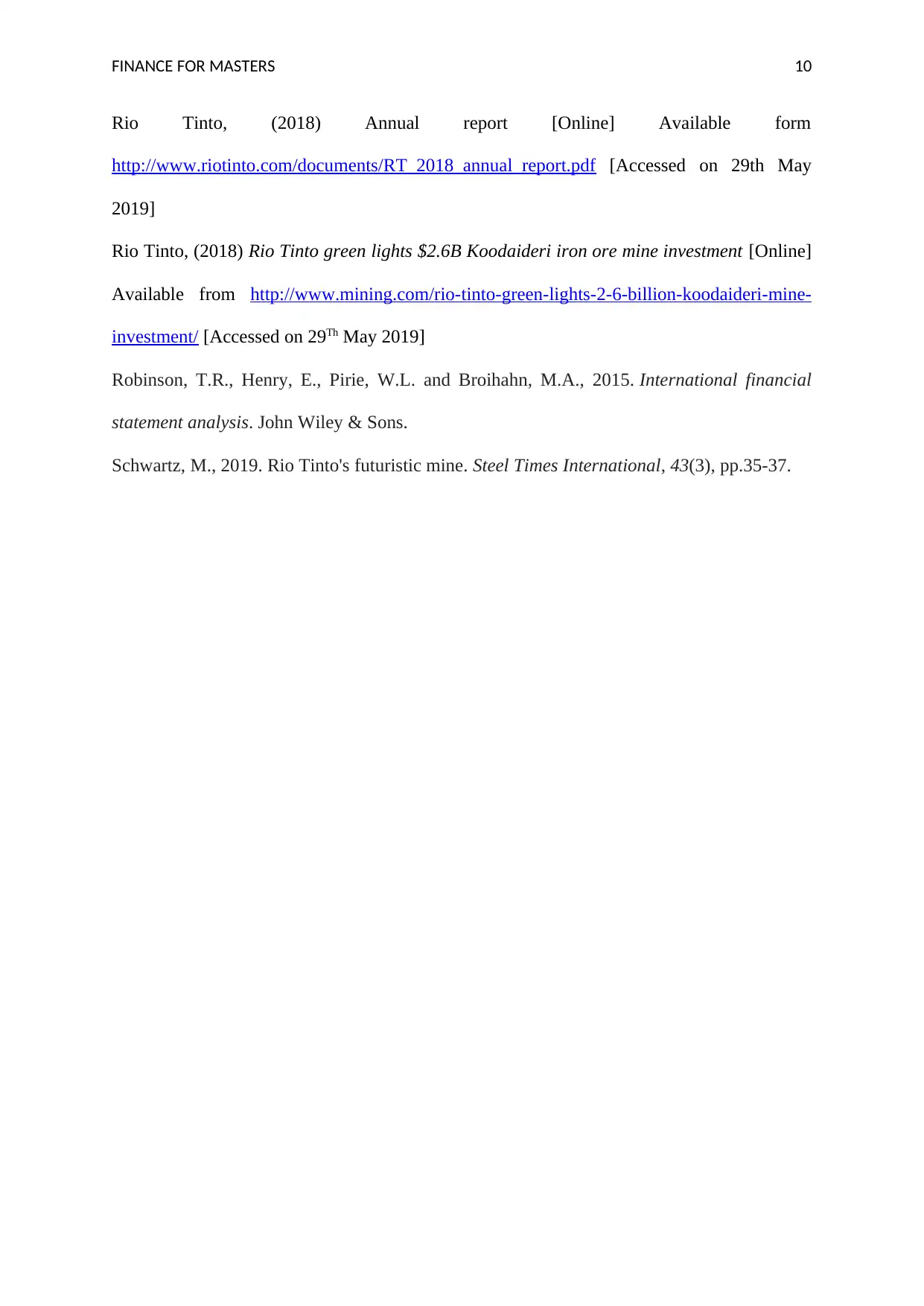
FINANCE FOR MASTERS 10
Rio Tinto, (2018) Annual report [Online] Available form
http://www.riotinto.com/documents/RT_2018_annual_report.pdf [Accessed on 29th May
2019]
Rio Tinto, (2018) Rio Tinto green lights $2.6B Koodaideri iron ore mine investment [Online]
Available from http://www.mining.com/rio-tinto-green-lights-2-6-billion-koodaideri-mine-
investment/ [Accessed on 29Th May 2019]
Robinson, T.R., Henry, E., Pirie, W.L. and Broihahn, M.A., 2015. International financial
statement analysis. John Wiley & Sons.
Schwartz, M., 2019. Rio Tinto's futuristic mine. Steel Times International, 43(3), pp.35-37.
Rio Tinto, (2018) Annual report [Online] Available form
http://www.riotinto.com/documents/RT_2018_annual_report.pdf [Accessed on 29th May
2019]
Rio Tinto, (2018) Rio Tinto green lights $2.6B Koodaideri iron ore mine investment [Online]
Available from http://www.mining.com/rio-tinto-green-lights-2-6-billion-koodaideri-mine-
investment/ [Accessed on 29Th May 2019]
Robinson, T.R., Henry, E., Pirie, W.L. and Broihahn, M.A., 2015. International financial
statement analysis. John Wiley & Sons.
Schwartz, M., 2019. Rio Tinto's futuristic mine. Steel Times International, 43(3), pp.35-37.
1 out of 11
Related Documents
Your All-in-One AI-Powered Toolkit for Academic Success.
+13062052269
info@desklib.com
Available 24*7 on WhatsApp / Email
![[object Object]](/_next/static/media/star-bottom.7253800d.svg)
Unlock your academic potential
Copyright © 2020–2026 A2Z Services. All Rights Reserved. Developed and managed by ZUCOL.





